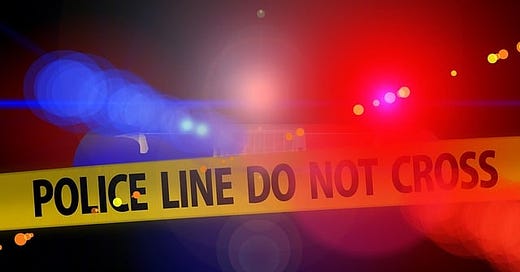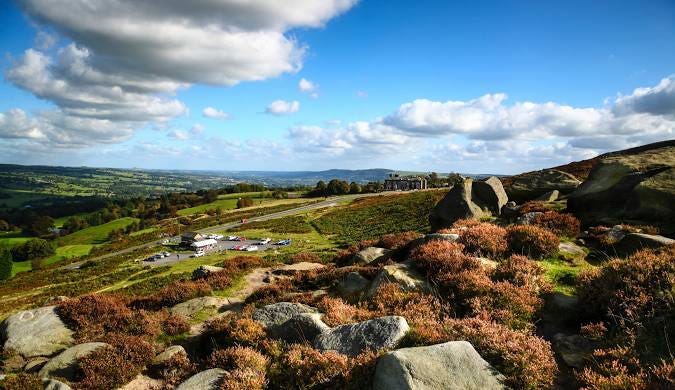I appreciate every single one of my readers. Thank you for being here and for reading my work. If you are able to upgrade to become a paid subscriber, you will gain access to my entire back catalogue of work, which includes over 250 articles, such as short stories, how I became a published author, and much more. If you have any questions, please don’t hesitate to get in touch.
Hello and welcome!
I have just returned from a fabulous weekend away in Yorkshire and had a curiously beguiling time. I attended the Crime Writers’ Association Northern Symposium and met some fascinating people.
The speakers were brilliant and topics ranged from how traditionally published writers can develop their careers in a changing market, to how to become a professional self-published author, and how to market your work. But the most intriguing speakers of the day (as much as I was interested in the topics relating to writing and getting your work out there) were the slots by Roger A. Price, a retired Detective Inspector and Kate Bendelow, a Crime Scene Investigator with Greater Manchester Police. Both have written several books, and Kate has been praised by Lynda La Plante for her industry bible for crime writers. If you go on Roger’s website, there is a selection of all the great books that he has penned.
Listening to these two experts relaying incidents from their professional lives and giving us (a bunch of crime writers) insights into such things as ‘the best way to murder somebody’ and learning how an assassination was solved using clues left by the murderer was mind-boggling. The detail that both speakers went into when describing a crime scene was captivating. Kate Bendelow said that she had no idea where the outline of a dead body drawn in chalk came from because, in real life, that would never happen. The crime scene would become contaminated, and she went on to explain how metal steps are put in place to avoid any contamination of the scene. Numbered markers are used to identify clues or pieces of evidence and the job of the CSI or SOCO (Scenes of Crime Officer) is to gather all the information from the crime scene. They don’t analyse anything; they just gather it all together and pass it on to the relevant police department for analysis and further investigation.
Kate had a great sense of humour and told us about one incident she attended when a rather scruffy-looking guy answered the door and told her that he probably knew more about her job than she did. When she gave him a quizzical look, he told her he had watched the entire box set of CSI, so he would know what to look for. Kate then proceeded to tell us how some scenes portrayed on television are very different from those in real life. Like when police offers just pull on a pair of latex gloves and start poking around a crime scene without donning the full protective gear, include shoe covers in order to avoid contaminating the crime scene. This was just one example of how television programmes can sometimes get things wrong.
It was also interesting to learn that you don’t need a degree to become a CSI; she said that she started out with a degree in photography and when she joined the police force, they provided all the training necessary for her to then become a CSI. She told us the best ways to murder somebody and what to look out for when writing a crime scene. Drowning is pretty good because you can get rid of the body. Burning the body is also a good idea as key evidence can be destroyed. Poisoning is another method. When strangling somebody, it is probably best to use a ligature or scarf to limit the amount of DNA left on the body. And the list went on - plenty of food for thought…
I found her insight into crime scenes fascinating and am going to invest in one of her industry bibles for future reference.
Roger A. Price was just as charismatic and spoke very eloquently, portraying some gruesome scenes from his past professional life with great detail and some interesting facts. For example, only the Home Secretary can authorise a phone tap and he explained how difficult it is to get that authorisation, for obvious reasons. He too had a great sense of humour, which I guessed was their way of dealing with the gruesome scenes that they faced on a regular basis.
We also learnt that police informers are only ever referred to by a specially allocated number in order to protect their identity and that their problems become their handlers’ problems. He went on to expand on this; kids getting thrown out of school, their houses being fire-bombed and a seedy world that felt a million miles away from the tranquil scene outside the conference room window, overlooking Ilkley Moor.
Stunning Ilkley Moor
Roger A. Price went on to say that undercover cops are the unsung heroes of police work, risking their lives when they infiltrate violent gangs involved in drug dealing or terrorist organisations. He also told the story of a local Accountant who, back in the 1990s, was assassinated because he became greedy. The Mafia family that he was keeping accounts for decided it was time to get rid of him because he wanted out and knew too much. Roger went on to describe the harrowing scene that he and his fellow officers discovered when they attended the crime scene. The guy had been taken into the garage and told to kneel, and two bullets had been fired into his head, just behind his right ear, resulting in instant death. Three members of his family had been bound and gagged in the house. He told us how meticulously he and his fellow officers had sifted through the evidence, including finding a half of a thumb from a latex glove, which provided vital evidence. Bit by bit, they pieced the clues together and, four years later, made an arrest; the assassin was put behind bars where he belonged.
I came away feeling buoyed up after mixing with some of the wonderful authors (and in some cases, their lovely partners) who made up the delegates. It felt good to be part of a niche group of people with a love of crime writing in common. Some authors wrote historical novels, others psychological thrillers and, although I didn’t meet anyone, I am sure there must have been an author or two of cosy crimes.
I am now going to polish my pitch letter to get it ready to send out for submission. After a three-month hiatus of not wanting to write, I enjoyed the Crime Writer’s Association weekend so much that it has spurred me on to keep writing.
Next week, I will tell you the reason for my non-productive period and share the heartbreak of what happened to me, so don’t forget to tune in. Until then, have a great week.
Take care,







Sounds great Rosy! Glad it renewed your passion for writing xx
That sounds like a fantastic conference. My own personal opinion is that if you just want to murder and get away with it for the sake of it, drive to a different city and the farther away, the better. Pick somebody at random and shoot them with a shotgun and go back to your life. There would be no evidence and nothing tying you to the crime. Plus, it would be quick. Shotguns don't play. Obviously, you wear a mask, as well and pick the right area to do this in where few would notice the shot. I would think in the country during an afternoon would do well. People hear shotguns out there all the time. But of course, murder needs motivation, too. If you're connected to the victim, you're probably getting caught and that, of course, is a good thing. Hehe. Great post, Rosy.